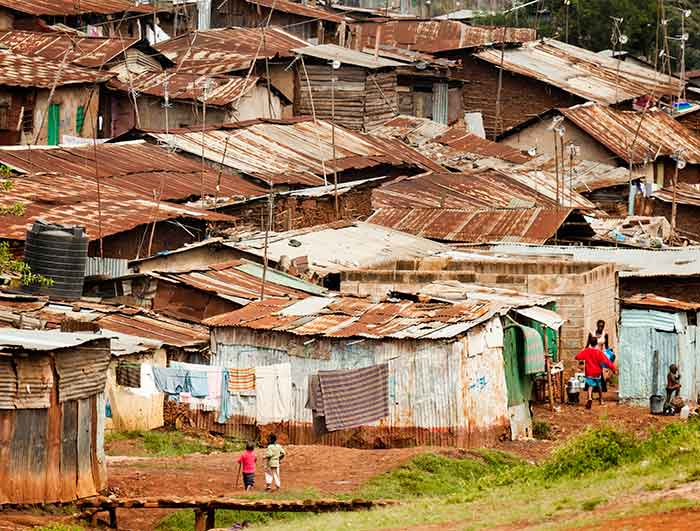africa_istock.jpg

A slum neighborhood in Nairobi, Kenya
The NGO said that despite decades of record GDP growth, poverty has declined more slowly in Africa than any other region as the fruits of economic expansion are shared among a wealthy elite only, leaving millions of ordinary Africans behind.
Winnie Byanyima, Oxfam’s executive director, said African leaders should “stop imitating the failing policies of Europe and America”, developing instead a new economic model that works for all Africans rather than just the fortunate few.
“African leaders must not kid themselves,” she said. “If the wellbeing of our people and the protection of our environment are our primary aims rather than a hoped-for-by-product of free markets, we need to explicitly design our economies to achieve these things.”
Tackling rising inequality should be a priority, Oxfam said, highlighting research from the Brookings Institution that has highlighted that the levels of inequality in many African countries are higher than previously thought.
Brooking’s research, which attempted to top incomes in a way that is not possible in most standard inequality measures, found inequality was a larger issue in numerous countries worldwide than previously thought.
In Africa, however, the difference was stark. Nigeria’s score almost doubled, pushing the country into the top ten most unequal nations in the world from its previous ranking of 37th.
Oxfam highlighted that, using Brooking’s measure, seven of the 20 most unequal countries in the world, and all of the top four, are African: Swaziland would take the top spot, followed closely by Nigeria, Namibia and South Africa.
To coincide with the World Economic Forum on Africa, which kicks off in Durban today, Oxfam called on leaders to build a new economic model that works for all.
This should include investment in economic activities that support livelihoods, such as agriculture. Despite over half of the continent’s total labour force working in the sector, smallholder farming – with the highest potential to reduce poverty – has been neglected for decades, it said.
Greater investment is also needed in public services, which should be easily accessed by the most vulnerable, training and access to credit, technology and social protection.
Oxfam also urged governments to foster alternative business models, such as cooperatives or social enterprises, and create tax systems that ensure big businesses and wealthy individuals pay their fair share.
Siphokazi Mthathi, Oxfam South Africa executive director, said too many donors, governments and investors prefer to put their money into large scale industrial agriculture and “mega public-private partnerships”.
This does “more for the bank balances of an already wealthy elite” than those living in poverty,” she continued, calling on African leaders to “start putting people first”.
“We would like to see an economic revolution across Africa, which ensures that the poorest can share the benefits of economic success.”













